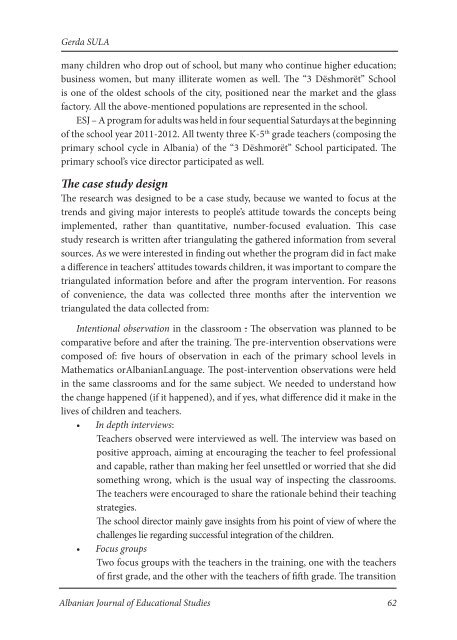Download - qendra per arsim demokratik
Download - qendra per arsim demokratik
Download - qendra per arsim demokratik
You also want an ePaper? Increase the reach of your titles
YUMPU automatically turns print PDFs into web optimized ePapers that Google loves.
Gerda SULAmany children who drop out of school, but many who continue higher education;business women, but many illiterate women as well. The “3 Dëshmorët” Schoolis one of the oldest schools of the city, positioned near the market and the glassfactory. All the above-mentioned populations are represented in the school.ESJ – A program for adults was held in four sequential Saturdays at the beginningof the school year 2011-2012. All twenty three K-5 th grade teachers (composing theprimary school cycle in Albania) of the “3 Dëshmorët” School participated. Theprimary school’s vice director participated as well.The case study designThe research was designed to be a case study, because we wanted to focus at thetrends and giving major interests to people’s attitude towards the concepts beingimplemented, rather than quantitative, number-focused evaluation. This casestudy research is written after triangulating the gathered information from severalsources. As we were interested in finding out whether the program did in fact makea difference in teachers’ attitudes towards children, it was important to compare thetriangulated information before and after the program intervention. For reasonsof convenience, the data was collected three months after the intervention wetriangulated the data collected from:Intentional observation in the classroom . The observation was planned to becomparative before and after the training. The pre-intervention observations werecomposed of: five hours of observation in each of the primary school levels inMathematics orAlbanianLanguage. The post-intervention observations were heldin the same classrooms and for the same subject. We needed to understand howthe change happened (if it happened), and if yes, what difference did it make in thelives of children and teachers.• In depth interviews:Teachers observed were interviewed as well. The interview was based onpositive approach, aiming at encouraging the teacher to feel professionaland capable, rather than making her feel unsettled or worried that she didsomething wrong, which is the usual way of inspecting the classrooms.The teachers were encouraged to share the rationale behind their teachingstrategies.The school director mainly gave insights from his point of view of where thechallenges lie regarding successful integration of the children.• Focus groupsTwo focus groups with the teachers in the training, one with the teachersof first grade, and the other with the teachers of fifth grade. The transitionAlbanian Journal of Educational Studies 62


